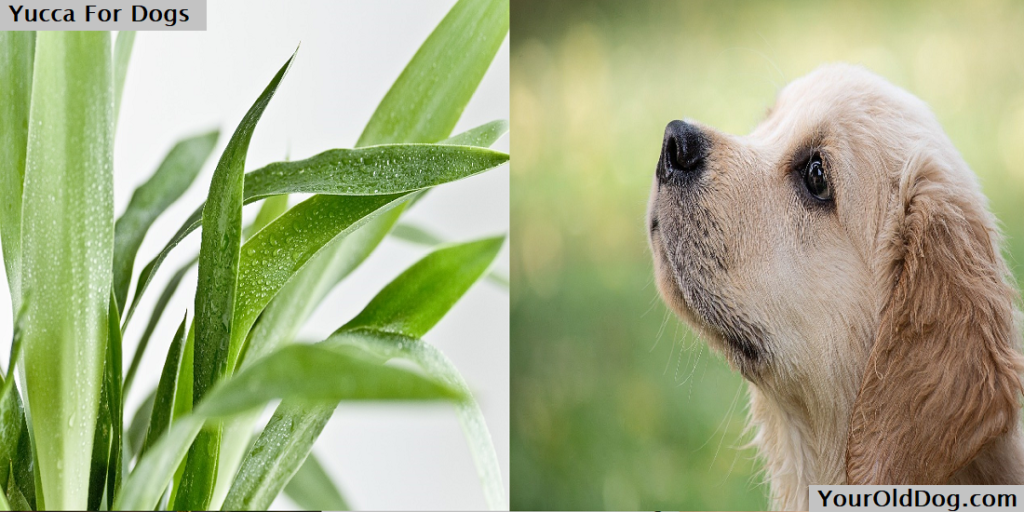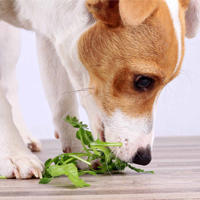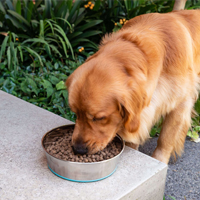
Yucca For Dogs and How To Safely Use It
This article will help you to understand the benefits of yucca for dogs and how you may be able to safely use it for your own dog.
Is your dog in pain or itchy? If so, you definitely need to learn more about Yucca and how it can help.We prefer and have used Yucca Intensive by Azmira for its purity and because liquid extracts are usually better.
Therapeutic Use
The roots of yucca hold its therapeutic properties, with a chopped variety of yucca root or a dried herbal variety often used. Tinctures are also recommended for specific applications.
- Yucca is useful because of the considerable quantities of vitamin C, beta-carotene, calcium, iron, manganese, magnesium, niacin, phosphorous, protein, and B vitamins included. The saponin compounds form the bulk of yucca’s beneficial properties in animals, however.
- Saponins are plant glycosides that foam up when met with water. These can help aid digestion with their foaming properties, helping the integration of minerals and vitamins by helping them pass through the intestinal walls. This gives the nutritional value of your dog’s food a little boost.
- Adding yucca to your dog’s daily diet or bathing your dog with a shampoo made of yucca can help with psoriasis and other skin issues.
- Yucca has also been included in dog food formulas because it reduces some of the more, shall we say, unpleasant odors in urine and feces. This is because yucca has properties that inhibit the dog’s production of anhydrous ammonia, the foul-smelling component to waste. The trouble here is that people turn to yucca as an alternative for actually feeding the dog a properly-balanced diet, choosing to eliminate the symptom (foul-smelling excrement) in favor of meeting the needs of the pet.
- Yucca has also been used to alleviate some of the pain and inflammation of arthritis, with the saponin extract forming the beneficial component. According to naturopaths and veterinarians, yucca has a 50 to 80 percent success rate when it comes to alleviating symptoms of arthritis in dogs.
But, be sure to read the preventative measures section of this article as well.Dosage for arthritis symptoms: To stimulate appetite or alleviate symptoms of arthritis, add about a half teaspoon of dried or powdered root for every pound of dog food. It supposedly works very well when combined with Alfalfa for arthritic pain due to inflammation.

Preventative Measures
Yucca is considered to be a category 2 herb which means that it’s safe in SMALL DOSES. Avoid feeding more than 4-5 times weekly, more than a month or two at a time or if a female is pregnant.
The saponins in the plant may reverse effect and slow down nutritional absorption. If you plan to use yucca, use it sparingly and give your dog a break between inclusions in the diet.
As mentioned above, yucca should not be used as a substitute for a balanced diet. If you’re worried about the odor of your dog’s stool or urine, do something about it by providing a balanced diet and proper exercise. Yucca is not a catchall solution to bad smells, although those effects are certainly neat.
Because of yucca’s foaming action and the ability it has to help assimilate nutrients into your dog’s digestive system, it should not be overused due to risk of possible irritation to the stomach lining. It has been known to cause vomiting in some cases, but it has conversely been used to induce vomiting in others.
Too much yucca causes digestive distress and bloating in dogs which is deadly.
Reasons to Use
The best use of yucca root appears to be as a nutritional aid to help your dog get the most from his or her food. Available at most herb retailers and even landscaping outlets, yucca can be safely but cautiously integrated into a dog’s dietary routine.
In its dried or powdered form, it can be used as part of dog food to alleviate symptoms of arthritis and aid in digestion, but it shouldn’t be overused and you should monitor your dog’s reactions to yucca.
History of the Yucca Plant
There is some argument about where exactly yucca belongs in the plant family, but most botanists are in agreement that it is not a cactus. Most modern botanists actually consider it part of the lily family.
Yucca plants are typically native to the dryer parts of North America, Central America, South America, and the Caribbean. Some yucca plants have been found as far north as Alberta in Canada, due in large part to the dryer desert areas of the province.
A lot of yucca persists in Mexico and even into Guatemala, with the plant having evolved to handle a lot of varying climates. Because of all the different properties included in the yucca plant, it is considered an excellent herb for dogs with arthritis.
References: Herbs for Pets by M.L. Wulff-Tilford and G.L. Tilford, Natural Remedies for Dogs and Cats by CJ Puotinen











